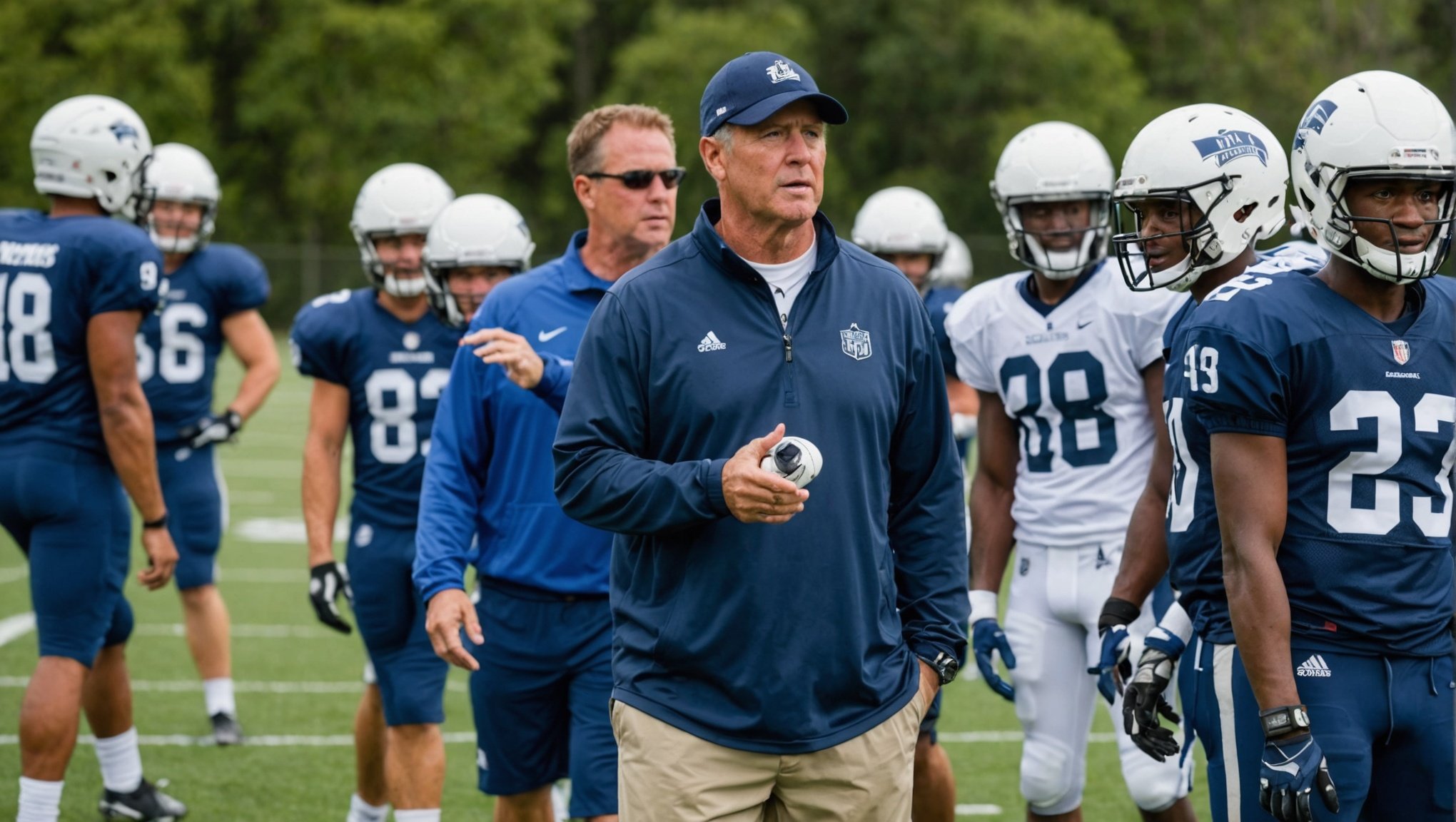Developing leadership skills in young athletes not only enhances their performance on the field but also shapes their character. Football coaches play a pivotal role in nurturing these abilities through tailored strategies that empower players. This guide explores effective techniques to cultivate leadership qualities, transforming young athletes into confident, responsible leaders. Discover how fostering teamwork, encouraging decision-making, and promoting resilience can unlock the full potential of your players, both on and off the pitch.
Importance of Leadership in Youth Sports
Leadership in sports plays a pivotal role in shaping the team dynamics. A strong leader can inspire unity, enhance communication, and drive a team towards common goals. This is particularly crucial in youth sports, where developing these skills can significantly influence young athletes' experiences and growth.
This might interest you : Boosting Young Players” Minds: Innovative Strategies for Cognitive Skills Training in Football Academies
For young athletes, the benefits of leadership skills extend beyond the playing field. These skills foster self-confidence, resilience, and the ability to handle pressure. Youth development through sports leadership encourages personal growth, helping athletes become more responsible and empathetic individuals.
Coaching significance is another essential aspect of leadership in sports. Coaches serve as role models, guiding young athletes in honing their leadership abilities. Effective coaching can instill values such as discipline, teamwork, and perseverance, which are invaluable in both sports and life.
Also to read : Enhancing Success: Strategies for UK Football Academies to Equip Young Talents for Professional Trials
The long-term impacts of leadership training on athletes are profound. Those who develop leadership skills early on are often better equipped to face challenges and seize opportunities in various aspects of life. They are likely to excel in academic, professional, and social settings, demonstrating the enduring value of leadership in youth sports.
Effective Coaching Strategies for Leadership Development
Developing leadership skills in youth sports requires strategic coaching strategies that focus on skill development. One effective approach is incorporating leadership drills into practice sessions. These drills can simulate real-game scenarios, allowing young athletes to practice decision-making and communication skills in a controlled environment. By doing so, coaches can nurture a sense of responsibility and initiative among players.
Another impactful method is setting up mentorship programs within teams. Pairing experienced athletes with younger team members fosters a supportive learning environment. This not only aids in leadership training but also strengthens team bonds. Mentors can share insights, offer guidance, and model leadership behaviours that younger athletes can emulate.
Encouraging decision-making opportunities during games is also crucial. Allowing athletes to make strategic choices in real-time situations empowers them and builds confidence. Coaches can facilitate this by creating scenarios where players must decide on plays or strategies, thus promoting autonomy and critical thinking.
By implementing these strategies, coaches can effectively guide young athletes in their leadership journey, ensuring they acquire skills that will benefit them both on and off the field.
Psychological Insights into Youth Leadership
Understanding the youth psychology of young athletes is crucial in nurturing their leadership qualities. During different developmental stages, athletes experience varying levels of cognitive and emotional growth, which directly impacts their ability to lead. Recognising these changes allows coaches to tailor their approaches, ensuring that leadership training aligns with each athlete's maturity level.
Athlete motivation is another pivotal factor. Motivation drives young athletes to embrace leadership roles and responsibilities. Coaches can enhance motivation by setting achievable goals and providing positive reinforcement, which encourages athletes to push their limits and develop essential leadership qualities.
Self-esteem plays a significant role in an athlete's leadership potential. High self-esteem fosters confidence, making athletes more willing to take initiative and make decisions. Conversely, low self-esteem can hinder leadership development, as athletes may doubt their capabilities. Coaches should focus on building self-worth through constructive feedback and celebrating successes, no matter how small.
To foster resilience and confidence, strategies such as positive reinforcement and goal setting are effective. Encouraging athletes to view setbacks as learning opportunities helps build resilience. By implementing these strategies, coaches can cultivate a supportive environment where young athletes thrive as leaders.
Case Studies of Successful Leadership Programs
Exploring leadership programs that have achieved remarkable success offers valuable insights into effective youth sports coaching. These programs have been pivotal in developing young athletes' leadership qualities, often through innovative strategies and dedicated coaching.
One notable success story is the leadership initiative at a renowned sports academy. This program integrates leadership training with regular practice, emphasising decision-making and teamwork. Coaches here use real-life scenarios to challenge athletes, fostering a deeper understanding of leadership dynamics.
Interviews with coaches from successful programs reveal common strategies. For instance, many highlight the importance of creating a culture of trust and open communication within teams. Coaches often act as facilitators, guiding athletes to discover their leadership potential.
Learning from both failures and successes is crucial. Some programs initially struggled with rigid structures, which stifled creativity and growth. By adapting to a more flexible approach, these programs eventually thrived, demonstrating the importance of adaptability in coaching.
These success stories underscore the significance of tailored leadership programs in youth sports. By examining these examples, coaches can glean practical insights, enhancing their methods to nurture future leaders effectively.
Coaching Drills to Enhance Leadership Skills
Incorporating coaching drills into practice sessions is essential for fostering leadership skills in young athletes. These drills focus on enhancing communication and teamwork, which are vital components of effective leadership. One popular drill involves setting up scenarios where athletes must work together to achieve a common goal, such as navigating an obstacle course without verbal communication. This encourages non-verbal cues and strengthens team cohesion.
Leadership exercises often include role-playing scenarios. These activities allow athletes to step into leadership roles, guiding their peers through strategic decisions and problem-solving tasks. For instance, a coach might assign a player the role of team captain during a simulated game, requiring them to devise and execute a game plan. This practical experience is invaluable in developing real-world leadership skills.
Feedback mechanisms are crucial in refining these skills. After each drill or exercise, coaches should provide constructive feedback, highlighting strengths and areas for improvement. Encouraging peer feedback also fosters a supportive environment where athletes learn from one another. By incorporating these coaching drills, young athletes can develop robust leadership abilities that extend beyond the sports field.
Resources and Tools for Coaches
To effectively nurture leadership in youth sports, coaches need access to a variety of coaching resources and leadership tools. These resources can significantly enhance a coach's ability to develop young athletes' leadership skills.
Recommended Reading
Books and articles on leadership in sports are invaluable educational materials. Titles like "The Leadership Playbook" and "Leading with the Heart" offer insights into developing leadership qualities in athletes. These texts provide practical strategies and real-life examples, making them essential reads for coaches.
Online Courses and Workshops
For those seeking further training, numerous online courses and workshops focus on leadership development. Platforms such as Coursera and Udemy offer specialised courses that cover topics like team dynamics and motivational techniques. These resources allow coaches to learn at their own pace and apply new strategies in their coaching practices.
Networking Opportunities
Connecting with other coaches and experts is crucial for professional growth. Conferences and seminars provide networking opportunities, enabling coaches to exchange ideas and experiences. Engaging with a community of peers can lead to collaborations and the sharing of effective leadership tools, enriching the coaching experience.













